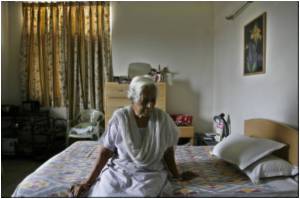Genes play an important role in women's health and those which were better at late-life male reproduction appears worse for women.

‘Old women are advised to be more careful about their health as they have more tendency to fall ill due to their genetic makeup.’
Read More..




"Shared genes tether the sexes together in an evolutionary tug of war," said Professor David Hosken, of the University of Exeter.Read More..
"Selection is trying to push females and males in different directions, but the shared genome means each sex stops the other from reaching its optima. "Basically, certain genes will make a good male but a bad female, and vice versa.
"However, after females reaches menopause, they no longer reproduce to pass on their genes which means selection (which is reproduction) on females is greatly weakened.
"So after that point, any genes that improve late-life male fitness will accumulate, even if they harm female fitness."
Professor Hosken said it was important to note that survival and health are not the same thing - and that the accumulation of late-life male benefit genes hinged upon males' ability to continue reproducing after the age of female menopause.
Advertisement
Advertisement








